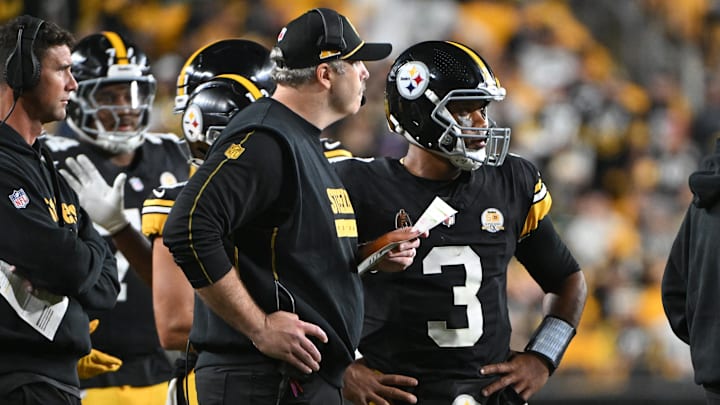The Pittsburgh Steelers' 2024 season was going so well... until it wasn't. After a scorching start to the campaign, the Steelers lost four straight to end the regular season. Then, in a rivalry matchup with the Baltimore Ravens on the postseason stage, the Steelers looked utterly hapless.
So, what happened? Was it injuries? Did the NFL just figure the Steelers out? Maybe a bit of both?
There are a lot of factors and plenty of blame to go around. That said, it's hard not to zero in on offensive coordinator Arthur Smith when looking for folks to pin Pittsburgh's demise on. After such a disappointing head coaching stint in Atlanta, suspicion was already high when it came to Smith's efficacy as a play-caller. This season appeared to prove the doubters correct. Smith just doesn't have it.
Pittsburgh's offense noticeably curtailed late in the campaign. It's not a coincidence that Russell Wilson's future is now marred in uncertainty. What once felt like a fruitful marriage spoiled in record time, and it would appear that Smith is to blame. There was well-documented friction between Wilson and Smith. The reason for that friction threatens to turn the entire fanbase against their new OC.
Steelers' sharp offensive decline was all because Arthur Smith got in Russell Wilson's way
Smith became frustrated with Wilson's tendency to change plays at the line of scrimmage, per Gerry Dulac of the Pittsburgh Post-Gazette. He wanted Pittsburgh to stick to the game plan, which involved running the football down opponents' throats. Wilson wanted to embrace a more robust passing attack.
"According to several sources, Smith did not want Wilson changing plays at the line of scrimmage, like he did in Cincinnati, and deviating from the game plan. Wilson’s desire to attack with the pass and throw down the field clashed with Smith’s run-first mentality, causing philosophical friction between the two."
Wilson's best game of the season came against the Cincinnati Bengals in Week 13. He threw for 414 yards and three touchdowns as Pittsburgh outlasted an explosive Cincy offense, 44-38. One would think that was cause for celebration and reason enough to continue letting Wilson improvise at the line of scrimmage. Smith, however, felt differently. The offense changed, and Pittsburgh's season fell apart.
In his first six starts, through the Cincinnati game, Wilson averaged 271 yards and 1.7 touchdowns per game, completing 65.6 percent of his pass attempts. In the five starts after his best performance of the season, Wilson averaged 171.2 yards and 1.2 touchdowns, completing just 61 percent of his passes.
Smith effectively put the muzzle on his quarterback for reasons that boil down to ego more than tangible results. There was conflict, sure, because Wilson clearly had the right perspective on things, and Smith was unwilling to cede control. The Steelers are now expected to start Justin Fields next season, but can we realistically expect anything to change with Smith calling the shots? Probably not.
Russ has endured his share of valid criticism in recent years, but he was performing at a Pro Bowl level in Pittsburgh prior to the Steelers' sudden, unforced collapse. Pittsburgh fans are too familiar with the negative impact of a run-heavy, dink-and-dunk offense.
It's what Matt Canada ran for years. Mike Tomlin is traditionally fiercely loyal to his coordinators, but Smith's performance in year one did little to establish long-term confidence. The Steelers would be better off with a more ambitious play-caller next season.
